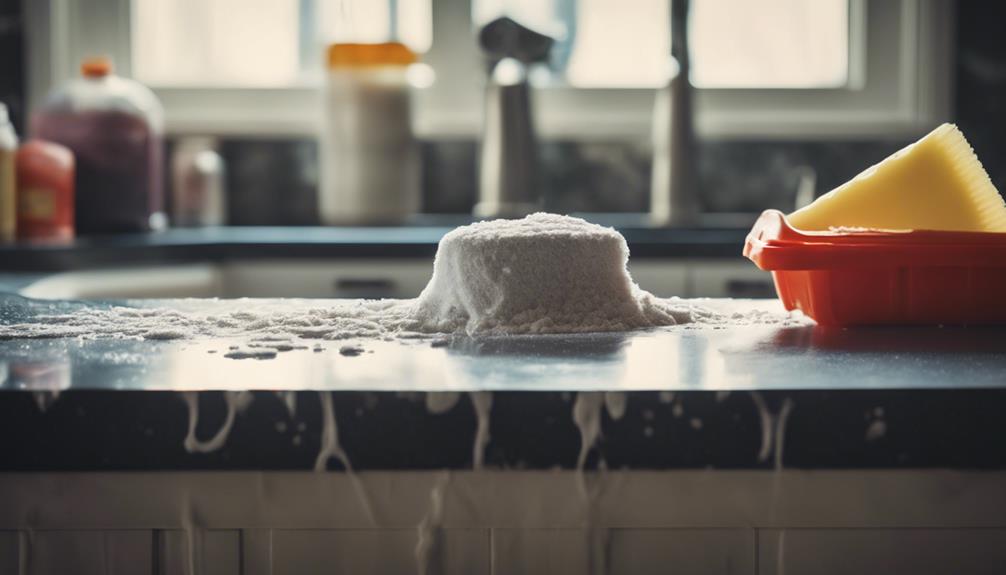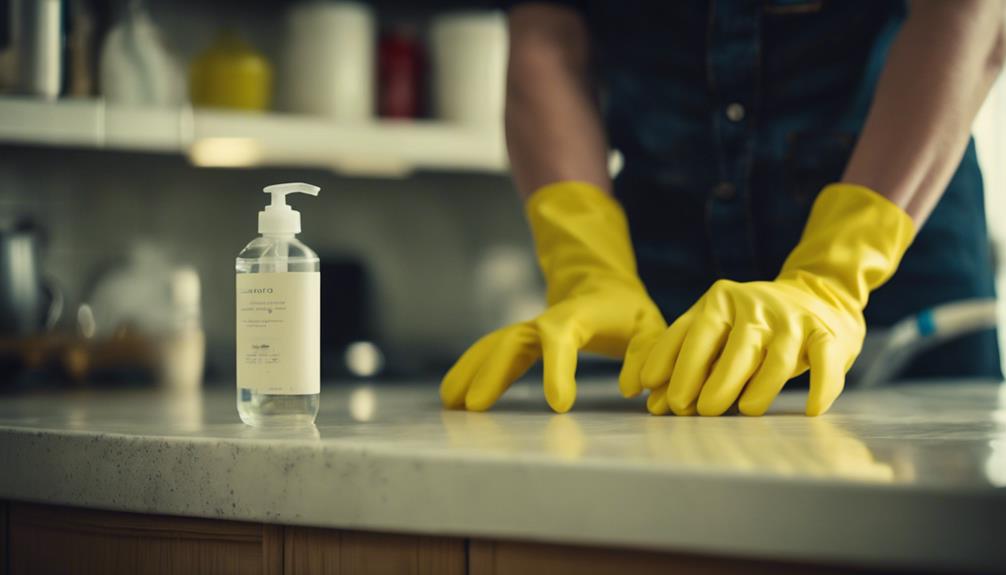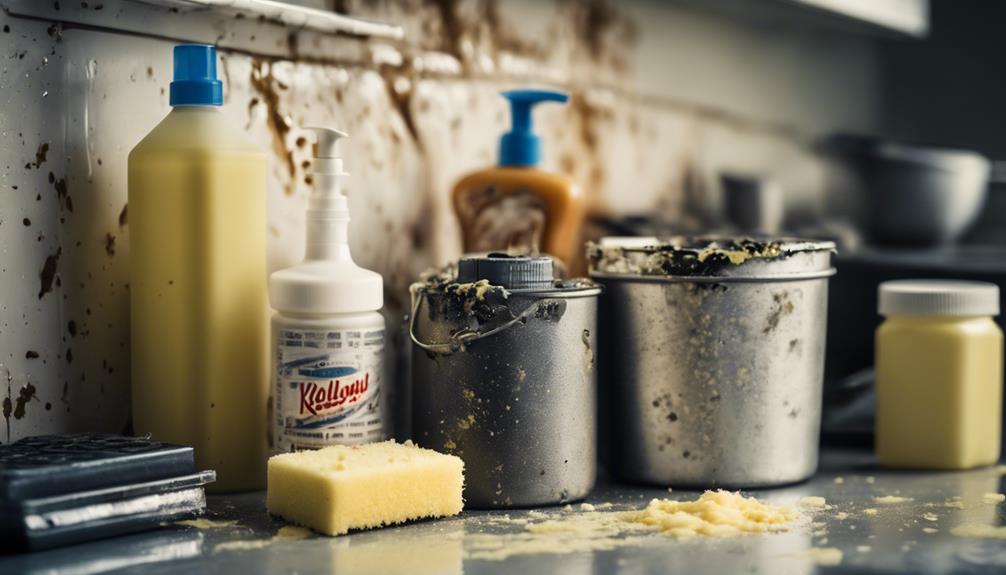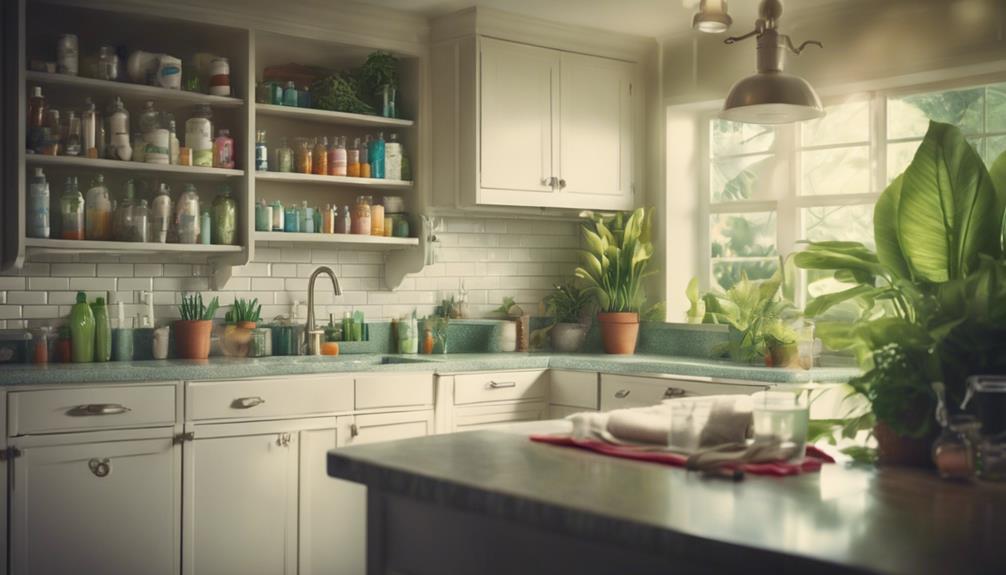You can start tackling kitchen grease buildup by preparing your kitchen for cleaning, clearing countertops, and removing items that obstruct the cleaning process. Natural degreasers like vinegar, baking soda, and lemon or orange oil can be used to remove tough grease. Gentle cleaning methods and eco-friendly products are effective and safe for various kitchen surfaces. For a thorough clean, try combining vinegar, baking soda, and dish soap or using a DIY vinegar-water solution. Continue exploring these methods and discover the best approach for your kitchen's specific needs and surfaces.
Preparing the Kitchen for Cleaning
Before you start scrubbing away, clear everything off your kitchen countertops to access the surface and get a good look at what needs attention. This will give you a clear view of the areas that need extra cleaning, especially those prone to grease buildup. Remove any items that could obstruct your cleaning process, and take a moment to inspect your kitchen surfaces.
Prepare your kitchen for a deep clean by removing burner plates from the stove to clean underneath and prevent grease from accumulating. This will make it easier to clean and maintain your stove in the long run.
Soak cabinet hardware in warm, soapy water to easily remove grease and grime that can be tough to clean. Place towels under your cabinets to catch any dripping water while cleaning to make sure a safe and mess-free cleaning process.
Natural Degreasers for Kitchen Surfaces
Combine vinegar, baking soda, and dish soap to create a potent, all-natural degreaser that effectively tackles kitchen grease on various surfaces. This mixture is a game-changer for cleaning your kitchen, as it's free from harsh chemicals and gentle on surfaces.
You can also try using lemon or orange oil as a natural alternative to cut through tough grease. For a gentler approach, mix baking soda with warm water to create a gentle abrasive that helps remove grease from surfaces.
If you're looking for a more targeted solution, white vinegar diluted with water is an excellent natural degreaser for kitchen cabinets and walls. Additionally, consider using green cleaning products like Mean Green Cleaner & Degreaser, which offer safe and biodegradable options to remove kitchen grease effectively.
When using these natural degreasers, make sure to test a small area first to validate that the solution doesn't harm your kitchen surfaces. By incorporating these natural degreasers into your cleaning routine, you'll be able to keep your kitchen clean and grease-free without exposing yourself or the environment to harsh chemicals.
Removing Grease From Countertops

Now that you've learned about natural degreasers, it's time to tackle the grease on your countertops.
You'll be happy to know that removing grease from countertops is a relatively simple process that requires minimal effort and the right cleaning solutions.
Greasy Surfaces Begone
You can effectively banish greasy countertops by deploying a degreaser or whipping up a DIY solution of equal parts vinegar and water. This safe method allows you to remove the grease without damaging your surfaces.
Before you begin, make sure your countertops are clean to get the best degreasing results. Then, grab a microfiber cloth, dampen it with hot water, and wipe down the countertops for a thorough clean.
If you're dealing with stubborn grease buildup, mix equal parts vinegar and water in a spray bottle and spray it onto the surface. Let it sit for a few minutes before scrubbing it off with a sponge.
Regularly cleaning your countertops with vinegar can prevent grease from accumulating in the first place. By using these safe methods, you'll be able to remove grease off your kitchen countertops and maintain a clean kitchen.
With greasy surfaces begone, you'll enjoy a cleaner, healthier kitchen space.
Daily Cleaning Habits
By incorporating daily wiping into your routine, you can keep your countertops consistently clean and grease-free. This habit helps maintain a hygienic environment in your kitchen by preventing grease buildup.
To wipe down your countertops effectively, mix soap with hot water and use a microfiber cloth. This combination guarantees a thorough cleaning and prevents streaks. After wiping, rinse your countertops thoroughly to eliminate any remaining residue.
Regular cleaning is key to maintaining a clean kitchen. By implementing daily cleaning habits, you'll keep your countertops free of grease and grime. This, in turn, reduces the risk of grease buildup, which can be a challenge to remove.
By wiping down your countertops daily, you'll avoid the need for heavy-duty cleaning products and scrubbers, which can damage your surfaces.
Make daily wiping a priority in your cleaning kitchen routine. It's a simple habit to develop, and it pays off in the long run. With a clean and hygienic kitchen, you'll be more inspired to cook and prepare meals, and you'll enjoy the peace of mind that comes with a clean and healthy environment.
Effective Methods for Range Cleaning
How do you tackle the challenging task of removing stubborn grease from your range? Effective methods for range cleaning involve some preparation and caution. Before you start, remove knobs and grates to prevent damage. Then, apply a cleaning agent and let it sit for a few minutes to break down the grease.
Here are some essential tips to keep in mind:
- Be cautious around printed markings and gas burners to avoid damaging your range.
- Use soft cloths on glass top and induction cooktops to prevent scratching the surface.
- Allow the cleaning agent to sit for a few minutes to effectively break down grease.
- Repeat the cleaning process if necessary to make certain all grease is removed from the range.
Cleaning Greasy Cabinets and Shelves

Greasy cabinets and shelves can be a real nuisance, but tackling them with the right cleaning solution can make all the difference. To get started, mix warm water with mild dish soap to create a vital scrubbing solution. Dip a soft cloth into the mixture, wring it out thoroughly, and wipe down your greasy cabinets and shelves.
For tougher grease stains on wooden surfaces, try adding white vinegar or baking soda to the solution. Before applying any cleaning solution, test it on a small, inconspicuous area to confirm it won't damage the surface.
After cleaning, use a dry microfiber cloth to wipe down the cabinets and shelves, removing any excess moisture. This step is crucial to prevent water spots from forming.
Regular cleaning and maintenance are key to preventing excessive grease buildup on your kitchen cabinets. By following these steps, you'll be able to keep your cabinets and shelves looking their best.
Remember to wipe down surfaces regularly to prevent grease from building up in the first place. With a little elbow grease and the right cleaning solution, you'll be saying goodbye to those pesky grease stains in no time!
Tackling Grease in the Sink Area
Tackling grease in the sink area requires a thorough cleaning process to remove stubborn buildup. You'll need to be proactive to prevent excessive grease accumulation.
To get started, prioritize removing grease from dirty pots and pans before tackling the sink to prevent further build-up.
Here are some essential steps to follow:
- Clean the sink with hot water, dish soap, and baking soda to remove grease buildup effectively.
- Scrub the sink gently with a sponge to guarantee thorough cleaning without damaging the surface.
- Rinse the sink thoroughly after cleaning to eliminate all traces of grease and soap residue.
- Regularly clean the sink area to prevent excessive grease accumulation.
Safe Cleaning for Kitchen Walls

As you tackle grease on your kitchen walls, you'll want to explore grease-resistant paint options to make future cleaning easier.
You'll also need effective wall cleaning solutions that won't damage your walls, and daily maintenance tips to prevent grease buildup.
Grease-Resistant Paint Options
When selecting a paint for your kitchen walls, you'll want to choose grease-resistant options that can withstand the messiest of cooking sessions. This is essential for maintaining kitchen hygiene and making cleaning easier.
Here are some options to take into account:
- Semi-gloss and high-gloss finishes: These paints are easy to clean with mild soap and water, making them a safe and effective choice.
- Eggshell finish: This provides a smooth surface that resists grease and can be wiped down without damaging the paint.
- Satin finish: This offers a subtle sheen that repels grease, making it a safe option for kitchen walls.
- Washable paint: Opting for a washable paint specifically designed for kitchens can provide added protection against grease buildup and make cleaning easier.
Wall Cleaning Solutions
You'll want to turn your attention to safe cleaning methods for your kitchen walls to maintain their cleanliness and prevent grease buildup.
To create a gentle cleaning solution, mix dilute soap with white vinegar in water. Before applying the solution to the entire wall, test it on a small area to verify it won't damage the surface.
Use a soft sponge or cloth to wipe down the walls, gently removing grease and grime. Be sure to rinse the walls with clean water to remove any residue from the cleaning solution.
Finally, dry the walls thoroughly to prevent water damage and maintain cleanliness. By following these steps, you'll be able to effectively remove grease from your kitchen walls without damaging the surface.
Remember to always test a small area first and use a soft sponge or cloth to avoid scratching the walls. With these simple steps, you can keep your kitchen walls clean and grease-free.
Daily Maintenance Tips
How can you prevent grease buildup on your kitchen walls and maintain a clean environment? By incorporating daily maintenance tips into your routine, you can keep your kitchen walls free from grease and grime.
Here are some daily maintenance tips to help you remove grease from your kitchen walls:
- Wipe down walls daily: Use a soft sponge or cloth with a mild soap and water solution to gently scrub away grease without damaging the wall surface.
- Make it a habit: Incorporate wiping down walls as part of your daily kitchen cleaning routine to maintain a grease-free environment.
- Avoid harsh chemicals: Refrain from using harsh chemicals or abrasive materials on painted or wallpapered walls, as they can damage the surface.
- Regular maintenance is key: Regular wiping down of walls prevents excessive grease accumulation and keeps kitchen walls clean.
Homemade Degreasers for Kitchen Use
Make your own effective and eco-friendly degreasers using simple pantry staples like vinegar, baking soda, and dish soap to tackle kitchen grease. By mixing 1 cup of vinegar, 3 cups of water, 1 cup of baking soda, and ½ cup of dish soap, you can create a potent DIY degreaser that's gentle on surfaces yet tough on grease.
For a quick fix, you can also use olive oil in a spray bottle as a natural degreaser for kitchen surfaces.
When dealing with fresh grease stains, a simple vinegar-water mix is ideal. However, for tougher grease buildup, you'll need a stronger mix that incorporates vinegar, water, baking soda, and dish soap.
The best part? Utilizing homemade degreasers is a cost-effective and eco-friendly way to remove kitchen grease safely. By taking matters into your own hands, you'll save money and reduce your environmental footprint.
Green Alternatives for Kitchen Cleaning

Rethinking your cleaning arsenal to include green alternatives can greatly reduce your kitchen's environmental footprint. By choosing eco-friendly alternatives, you'll not only decrease your exposure to harsh chemicals but also contribute to a more sustainable approach to cleaning.
Here are some effective green alternatives to ponder:
- Green cleaning products: Mean Green Cleaner & Degreaser, Simple Green All-Purpose Cleaner, and Green Works Multi-Surface Cleaner are nontoxic and biodegradable, making them safe for most kitchen surfaces.
- Natural degreasers: Orange cleaner, lemon, and baking soda mixed with warm water are environmentally friendly options for removing kitchen grease.
- Eco-friendly cleaners: Always make sure the natural alternative you choose is safe for specific surfaces before use.
- Sustainable habits: Opting for green cleaning methods helps reduce exposure to harmful chemicals and supports a more sustainable approach to cleaning.
Preventing Future Grease Buildup
By incorporating a few simple habits into your daily kitchen routine, you can effectively prevent future grease buildup and keep your kitchen surfaces clean and grime-free. Start by using lids on pans while cooking to contain splatters and minimize grease accumulation. When cleaning up, wipe spills immediately with a cloth or sponge and dish soap to prevent grease from settling.
For tougher grease spots, try mixing baking soda and vinegar to create a natural grease fighter. Proper kitchen ventilation is also key in reducing airborne grease and preventing buildup on surfaces. To keep your kitchen cabinets clean, develop a routine for regular cleaning and consider using cabinet liners as a barrier against grease.
Conclusion
You've made it through the battle against kitchen grease! It's ironic that something so delicious can leave behind such a stubborn mess. But now, your kitchen shines like new.
Take a deep breath, savor the freshness, and remember: a clean kitchen isn't just about aesthetics, it's about health, safety, and the joy of cooking.
You've earned the right to get back to what you love – cooking up a storm, grease-free!